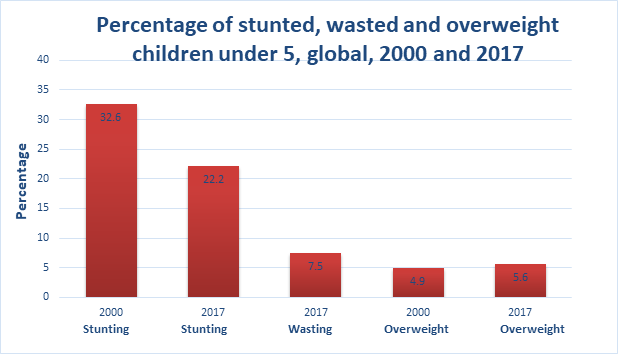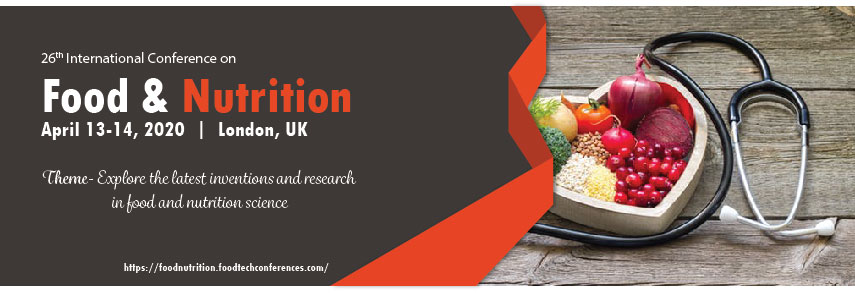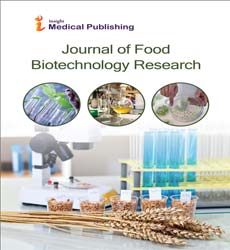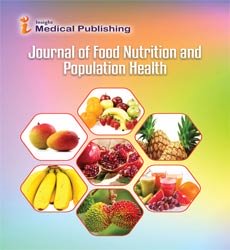Theme: Explore the latest inventions and research in food and nutrition science
Food & Nutrition 2020
Food and Nutrition 2020 cordially welcomes all the participants and contributors from worldwide to attend “26th international Conference on Food and Nutrition Science” which is going to be held in London, UK during August 24-25, 2020 across the theme “Explore the latest inventions and research in food and nutrition science“.
We invite you to join us at Food and Nutrition Science Conference, where you will be sure to have a meaningful experience with scholars from around the world. Generous response and active participation from the Editorial Board Members of conference related Journals as well as from the scientists, researchers and leaders in the field of Food & Nutrition Science will make this conference as one of the most successful and productive events in 2020.
Food and Nutrition Science Conference includes prompt keynote presentations, oral talks, poster presentations, delegate views, board talks, workshop and exhibitions. Join us for two intensive and interesting days of discussing contemporary challenges and new advancements in food science and nutritional research. We invite you to contribute and help to shape the event through submissions of your research abstracts, papers and e-posters. Also, high quality research contributions describing original and unpublished results of conceptual, constructive, empirical, experimental, or theoretical work in all areas of Food Science and Nutritional research are cordially invited for presentation at the conference.
Who/Why to Attend:
This is the finest opportunity to interact with participants from the Food Science associations, Food Biotechnology Associations, Food Microbiology Societies, and Food Science Academicians. It mainly concerns on the modern impact and technologies in Food Science & Technology and other relevant to Food & Nutritional Sciences, as well as for initiation of new assessments and technologies and the effectiveness of various regulatory programs on Food Science & Technology2020 conducts presentations, share knowledge, meet with present potential and eminent scientists, and receive name recognition at this two days event.
Our aim is to aggregate community and to create a platform for exchange of information on technological developments, new scientific innovations and the effectiveness of various regulatory programs towards Food Science & Food 2020. It provides a premier technical forum for expressing and knowledge about the advanced research and developments, as well as exploration of new applications, technologies and to explore new trends in the field of Food Science & Technology.
Food Science & Technology Conference in 2020 in London, UK organize Food Meetings in the fields related to it like Food Microbiology, Food Sampling and Nutritional Science, Food Science, Food Technology.
Objective:
-
Establishing the professional network.
-
Creating contacts to provide a means for scientific and industrial exchanges.
-
Boosting the scientific research with other scientific professionals in the country and throughout the world.Strengthening the network between the university and other related industries.
-
Summarize the studies of Food and Nutrition Science
-
Discussing the latest findings and achievements in Food Science & Technology and Nutrition Science.
Target Audience:
-
Food technologist
-
Microbiologist
-
Food safety officers
-
Nutritionists
-
Public Health professionals
-
Dietician
-
Quality control officers
-
Quality assurance officers
-
Scientists
-
Product Recall and Development Specialists
-
Researchers
-
Biotechnologists
-
Industrialists
-
Food Engineers
Track 1: Food Industry
The food industry is a complex, worldwide group of diverse businesses that supplies most of the food consumed by the world's population. The food Industry incorporates. Food technology is a sub discipline of food science that deals with the production, Preservation & processes that make foods
Biotechnology is any technique which utilizes living organisms to make products, to improve plants or animals, or to develop microbes for specific uses. This definition covers the traditional procedures of animal husbandry, plant breeding and fermentation
-
Food Manufacturing: agrichemicals, agricultural construction, farm machinery and supplies, seed
-
Wholesale and food distribution
-
Foodservice
-
Food Technology
Track 2: Food Science and Nutrition
Food Science blends food microbiology, chemistry, physics, engineering and nutrition, therefore, the application of data so gained to the event of food product and processes, the preservation and storage of foods, and therefore the assurance of food safety and quality. It is a basic process of how heat, water, acid, and base change our foods.
-
Macronutrients
-
Micronutrients
Track 3: Prebiotic nutrients
Prebiotics are a group of nutrients that are degraded by gut micro biota. Their relationship with human overall health has been an area of increasing interest in recent years. They can feed the intestinal microbiota, and their degradation products are short-chain fatty acids that are released into blood circulation, consequently, affecting not only the gastrointestinal tracts but also other distant organs. Fructo-oligosaccharides and galacto-oligosaccharides are the two important groups of prebiotics with beneficial effects on human health..
Track 4: Probiotics nutrients
Probiotics are live microorganisms promoted with claims that they provide health benefits when consumed, generally by improving or restoring the gut flora. Probiotics are considered generally safe to consume, but may cause bacteria-host interactions and unwanted side effects in rare cases. There is little evidence that probiotics bring the health benefits claimed for them.
Track 5: Food Engineering
Food engineering is a multidisciplinary field which combines microbiology, applied physical sciences, chemistry and engineering for food and related industries.
-
Agricultural Engineering
-
Chemical Engineering
-
Sanitation Technologies
-
Modern Packing
-
Food Product Shelf Life
Track 6: Food Chemistry
Food chemistry deals with the study of chemical processes and interactions of all biological and non-biological components of food & nourishment. The biological component incorporates milk, meat, poultry, lettuce, beer etc. It is also similar to biochemistry for its main components such as protein, carbohydrates, lipids & also includes areas such as minerals, water, vitamins, enzymes, food additives
-
Food physical chemistry
-
Food & Flavour Chemistry
Track 7: Food Toxicology
Food toxicology is the study of the nature, properties, effects and detection of poisonous or toxic substances in food. Radioactive particles, heavy metal elements, or the packing substances used in food processing are examples of such substances.
-
Food Safety and Hygiene
-
Food-borne Disease
-
Food irradiation
-
Categories of Food toxicity
-
Food Science & Cardiac Care
Track 8: Food Microbiology
Food microbiology is a branch of Food Science to study of the pathogens that inhibit, contaminating food and microorganisms that may cause disease especially if food is inappropriately cooked or stored, those used to produce fermented beverages & foods such as cheese, yogurt, bread, beer, and wine, and those with other useful roles such as producing probiotics.
Fermentation is one of the techniques to preserve food and enhance its quality. Fermented food product is less affable to other harmful microorganisms, including spoilage-causing microorganisms & pathogens thus extending the food's shelf-life.
-
Food Safety and Hygiene
-
Food-borne Diseases
-
Food irradiation
-
Categories of Food toxicity
Track 9: Importance of Food Nutrition
The risk factors for fatal diseases, like type 2 diabetes and hypertension, are increasingly seen in younger ages, often a result of unhealthy eating habits and increased weight gain. Dietary habits built up in childhood regularly convey into adulthood, so teaching children how to eat healthy at a young age will help them stay healthy throughout their life.
-
Nutritional Deficiencies
-
Weight gain
-
High blood pressure
Track 10: Food Supplements
Dietary supplements may also contain substances that have not been confirmed as being essential to life, but are marketed as having a beneficial biological effect, such as plant pigments or polyphenols. Animals may also be a supply of supplement ingredients, as for example collagen from chickens or fish. These are also sold individually and in combination and may be combined with nutrient ingredients. In the United States and North American Nation, dietary supplements are considered a subset of foods, and are regulated accordingly. The European Commission has also established harmonized rules that help to insure that food supplements are safe and properly labeled.
Other aspects dealt in this track include:
-
Adulterants in Food
-
Herbal Supplements
-
Regulatory Compliance
-
Adverse effects
Track 11: Management of Food Waste
Recycling of food and organic waste is an innovative idea that can produce both economic and environmental savings. This naturally productive, budget-friendly, environmental friendly disposal from food waste management can benefit your company, your community and the environment.
Acceptable items for Organic & Food Waste Recycling can include
-
Fruits and vegetables
-
Meat, poultry, seafood
-
Bakery items and ingredients
-
Plants, cut flowers, potting soil
-
Coffee grounds, filters, tea bags
-
Paper products (napkins, paper towels)
Track 12: Food Poisoning
Food poisoning, also called foodborne illness, is illness caused by eating contaminated food. Infectious organisms — including bacteria, viruses and parasites — or their toxins are the most common causes of food poisoning. Infectious organisms or their toxins can contaminate food at any point of processing or production. Contamination can also occur at home if food is incorrectly handled or cooked.
-
Contaminants
-
Tests to diagnose food poisoning
Track 13: Malnutrition Diseases
Malnutrition is a condition that results from eating a diet in which nutrients are either not enough or are too much such that the diet causes health problems. It may involve calories, protein, carbohydrates, vitamins or minerals. Not enough nutrients is called under nutrition or undernourishment while too much is called over nutrition.
-
Malnutrition and treatment
-
Undernutrition
-
Overnutrition.
Track 14: Food Safety Laws and Regulations
Generally “food law” is used to apply to legislation which regulates the production, trade and handling of food and hence covers the regulation of food control, food safety and relevant aspects of nourishment exchange. Least quality prerequisites are incorporated into the nourishment law to guarantee the sustenance delivered are unadulterated and are not subjected to any false practices expected to cheat the customer. Sustenance law should cover the aggregate chain starting with arrangements for creature sustain, on-cultivate controls and early handling through to definite conveyance and use by the shopper.
-
Food and Drug Administration Act and Laws
-
Good Manufacturing Practices
-
Food inspection
-
Risk analysis
-
Good hygiene practices and HACCP
Track 15: Food Quality
Food quality is the quality characteristics of food that is acceptable to consumers. This includes external factors of food characteristics (size, shape, colour, gloss, and consistency), texture, and flavour; factors such as federal grade standards (e.g. of eggs) and internal (chemical, physical, microbial).
-
Food Contaminants
-
Good Food Safety Practices
-
Food Quality Control in Food Industry
Track 16: Food Preservation
Food preservation includes processes that inhibit visual deterioration, such as the enzymatic browning reaction in apples after they are cut during food preparation. Maintaining or creating nutritional value, texture and flavor is very important facet of food preservation
-
Many processes designed to preserve food involve more than one food preservation method like:
-
Traditional techniques
-
Pasteurization
-
Fermentation
Track 17: Food Safety and Management
Food safety refers to controlling the presence of those hazards whether chronic or acute, that may make food harmful to the health of the consumer. Food safety is about producing, handling, storing and preparing food in such a way as to preclude infection and contamination in the food production chain, and to help ensure that food quality and goodness are sustained to stimulate good health. Food hygiene is the conditions and measures necessary to certify the safety of food from production to consumption. Lack of adequate food hygiene can lead to foodborne diseases and can cause the death of the consumer. The objective of food hygiene is to make and deliver safe food and consequently contribute to a healthy and productive society.
Track 18: Advancement in Food Technology
As the financial prudence of many countries are increasing, the customers have started using processed food more than the staples by using advanced food technology. As a matter of fact world-wide food processing technology business has extended to multi trillion dollars. It was reported that around, 16 million people work in the food industry. Recent improvements in food processing and technology are not only important to meet the increasing productivity demands but to adopt erudite automation, control and monitoring methods and techniques which make food more healthier and improve food quality
Track 19: Food and Quality Control
Food industry deals with highly sensitive products. This being the primary reason, maintaining quality standards and adhering to quality requirements are imperative for players in the food industry. Food quality is the quality characteristics of food that is acceptable to consumers. This includes external factors as appearance, texture, and flavour; factors such as federal grade standards and internal. Quality control (QC) is a reactive process and aims to identify and rectify the defects in finished products.
Track 20: Oncology Nutrition
The oncology dieticians provide expert nutrition counseling services to patients and their caregivers as an integral part of cancer care. Our aim is to improve overall nourishment, promote healthy eating habits and enhance overall well-being and quality of life.
Eating the right kinds of foods before, during, and after cancer treatment can enable the patient to feel better and stay stronger. A healthy diet incorporates eating and drinking enough of the foods and liquids that have important nutrients (vitamins, minerals, protein, carbohydrates, fat, and water) the body needs.
Track 21: Paediatric Nutrition
Pediatric nourishment is the maintenance of a particular well-balanced diet consisting of the essential nutrients and the sufficient caloric intake necessary to promote growth and sustain the physiological requirements at the various stages of a child's development
Track 22: Nutritional Value & Quality of Foods
The customer ought to be very much aware of the quality of the food. In this way, the food substances contain nutritional values, prepared in accurately, tasting good, don’t have toxic substances and pathogens, unwanted mix-up, fulfill requirements of health, attractive, and provides energy to carry out life and day to day activity is known as quality food. To put it plainly, we also say that the food substances acknowledged by government guidelines and satisfying the essential prerequisites of the individual wellbeing might be named the quality food.
Track 23: Altered Diet and Responses on Human Health
Dietary transitions in human records were suggested to play essential roles within the evolution of the human race. The main purpose of public health intervention is to boost health and prevent diseases but the problems of changing food habits result in both positive and negative impacts on human health. The diet of an individual is determined by the process, the supply, and taste property of foods. A healthy diet includes storage ways and preparation of food that may preserve nutrients from oxidation, heat or natural process. Research in nutrition terms may make it easier for us to make better food choices and keeps us healthy. Contemporary dietary patterns have led to acceptable results like increased nutritional efficiency, decreased the risk of allergies and also diseases like prevention of hypertension, cardiovascular diseases, and chronic diseases. It may give negative results such as causing skin irritation, difficulty in breathing, headaches, cancer due to pesticides; obesity, food poisoning, diabetes, dental problems, high blood pressure and depression due to processed foods; and arthritis, meningitis, inflammation of joints and ciguatera from fisheries.
-
Nutrient Deficiencies
-
Toxicities
-
Nutrient Imbalances
Track 24: New invention in Nutrition science
The truth about nourishment is always in motion. Previously coffee is a carcinogen, and another it’s a effective antioxidant. Carbs used to be the harmful, now (the right kinds of carbs) are the staple of a well-balanced diet.
Food has been a large part of this technological takeover, with lots of inventions being created for both industry and home uses. A portion of these inventions are incredibly fun and cool to upgrade your own love of food at any time in home . For home gardening, shopping, cooking these are the coolest inventions focusing to make your food experiences more comfortable, high-tech, and personal.
Scope and Importance of nutrition studies:
Over the preceding ten to fifteen years, sales in the worldwide nutrients and supplements market places have visible an amazing spike. This has recommended more than a few of new gamers to step into the market with merchandise that ability to be the tincture of adolescents, health, and energy. The Asia-Pacific market for clinical nutrition was estimated at USD 8.87 billion in 2018 and is projected to reach USD 13.07 billion by 2021, growing at a CAGR of 8.06 %.
According to the estimates of the Nutrition Business Journal report, the global nutrition and supplements market raised at US$96 billion as of 2013. A year later, it turned into nearly US$104 billion global. Going forward, the market is anticipated to reveal a CAGR between 6% and seven%. This charge of increase can be similar to that of advanced marketplace along with the US while growing markets along with Asia-Pacific will exhibit an uptick in boom charges. Sport vitamins can be designed to provide specialised support for athletes. Some of those encompass excessive-protein merchandise, together with amino acid dietary supplements, whilst additional products contain vitamins that help metabolism, power, and athletic overall performance and recuperation. People undertaking excessive athletic pastime can also have elevated requirements for water-soluble vitamins, antioxidants, and sure minerals, together with chromium. Sports drinks have blends of electrolytes (salts) that the body drops at some point of exertion and sweating, as well as nutrients, minerals, and overall performance-assisting herbs. Technavio’s studies analyst calculates the fitness supplement market in Malaysia to upward thrust at a CAGR of 8% throughout the projection length.
A Glance at Market of Nutrition and Food:
Throughout the last ten to fifteen years, deals in the worldwide Nutrition supplements market have seen a phenomenal spike. This has empowered various new players to venture into the business sector with items that guarantee to be the remedy for youth, wellbeing, and essentialness. As indicated by the appraisals of the Nutrition Business Journal report, the worldwide Nutrition and supplements market remained at US$96 billion starting 2012. After a year, it was around US$104 billion all inclusive.
Nutrition Supplements Market:
The global nutrition supplements market size was valued at USD 133.1 billion in 2016 and is expected to accelerate at a CAGR of 9.6% from 2016 to 2024. This impact is due to the rising awareness towards weight management among working professionals because of extensive brand campaigns by nutritional product manufacturers.
Nutritional supplements are majorly consumed with an intention to enhance the intake of essential nutritional elements in the human body. Increased cardiovascular disorders among the populations because of fluctuating diet patterns and inactive lifestyle among the age-group of 30-40 are expected to promote the importance of nutraceuticals.
Global Malnutrition Analysis:
Nearly half of all deaths in children under 5 are related to malnutrition, translating into the loss of about 3 million children per year. Malnutrition puts children at higher risk of dying from common infections, increases the frequency and severity of such infections, and delays recovery.

The interaction between under nutrition and infectious diseases can create a potentially lethal cycle of worsening illness and declining nutritional status. Poor nutrition in the first 1,000 days of a child’s life can lead to stunted growth, which in turn is associated with impaired cognitive ability and reduced performance in school and work.
We are still to achieve a world without malnutrition. The joint malnutrition (2018 edition) estimates show that stunting prevalence has been declining since the year 2000, nearly one in four. 151 million children under the age of 5 were stunted in 2017, and 51 million children suffered from wasting. Meanwhile, the number of overweight children in the world has remained constant for more than a decade.
Measures of child Malnutrition are used to track development progress. In the Post-2015 Development Era, estimates of child malnutrition will help to determine whether the world is on a track to achieve the Sustainable Development Goals – particularly to “end hunger, achieve food safety and improved health, and promote sustainable agriculture”.
Food Technology 2018
The 21st International Conference on Food Technology and Processing organized by Conference Series LLC Ltd was held in London, UK during October 04-06, 2018. Active involvement and generous comeback were received from the Organizing Committee Members, Editorial Board Members of Conference Series LLC Ltd Journals as well as from Prominent Scientists, Researchers and Young Student Community. Researchers and students who disclosed up from different parts of the globe have made the conference one of the most effective and prolific events in 2018. The conference was noticeable with the presence of renowned scientists, talented young researchers, students and business delegates motivating the three days event into the path of success with thought provoking Keynote and Plenary presentations highlighting the theme “Emerging Trends in Food Technology towards the Global Demand”.
The meeting was carried out through various sessions, in which the discussions were held on the following major scientific tracks:
- Food Technology
- Processing of Fruits and Vegetables
- Dairy Technology
- Microbiology of Foods
- Health and Nutrition
- Food Safety
- Food Additives and its Impact
- Enzymes in Food
- Management of Food Waste
The highlights of the meeting were the informative Keynote lectures from:
Petronila Mlowe, Britain Tanzania, UK on “Importance of quality assurance on agribusiness from Tanzania”.
Amanda M Naaum, TRU-ID., Canada on “Regulatory tools for DNA- based seafood testingin Canada: DNA barcoding and beyond”.
The Honourable Guests, Keynote Speakers, well-known researchers and delegates shared their innovative research and vast experience through their fabulous presentations at the podium of Food Technology 2018 Conference. We are glad to inform that all accepted abstracts for the conference have been indexed in Conference Series LLC Ltd Journal of Food Processing & Technology as a distinct issue.
We are also obliged to numerous delegates, company representatives and other renowned personalities who supported the conference by their active discussion forums. We are thankful to the Organizing Committee Members for their gracious presence, continuous support and assistance towards the fulfilment of Food Technology 2018. With the exceptional feedbacks from the conference, Conference Series LLC Ltd would like to publicize the commencement of the 23rd International Conference on Food Technology and Processing during October 07-08, 2019 in Dublin, Ireland.
Conference Highlights
- Food Industry
- Food Science and Nutrition
- Prebiotic nutrients
- Probiotics nutrients
- Importance of Food Nutrition
- Food Engineering
- Food Chemistry
- Food Toxicology
- Food Microbiology
- Food Supplements
- Food and preservation
- Management of Food Waste
- Food Poisoning
- Malnutrition Diseases
- Food Safety Laws and Regulations
- Food Quality
- Food preservation
- Food Safety and Management
- Advancement in Food Technology
- Food and Quality Control
- Nutritional Value & Quality of Foods
- Altered Diet and Responses on Human Health
- New invention in Nutrition science
- Oncology Nutrition
- Paediatric Nutrition
To share your views and research, please click here to register for the Conference.
To Collaborate Scientific Professionals around the World
| Conference Date | August 24-25, 2020 | ||
| Sponsors & Exhibitors |
|
||
| Speaker Opportunity Closed | |||
| Poster Opportunity Closed | Click Here to View | ||
Useful Links
Special Issues
All accepted abstracts will be published in respective Our International Journals.
- Journal of Food & Industrial Microbiology Open Access
- Journal of Nutraceuticals and Food Science
- Research & Reviews: Journal of Food and Dairy Technology
Abstracts will be provided with Digital Object Identifier by











